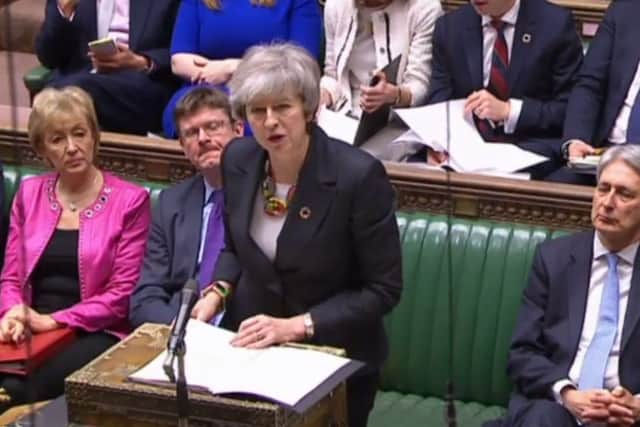Government clears way to rush through a last-minute Brexit deal
Appealing to MPs for more time to renegotiate her deal with Brussels, Theresa May told MPs she would allow House of Commons to lift a requirement for a 21-day waiting period before a vote to approve an international treaty.
Labour said the government was guilty of “contempt for our democracy”, but Mrs May said MPs had already had days of debate to examine the Brexit deal.
Advertisement
Hide AdAdvertisement
Hide AdMPs would then decide how to proceed. However, without support from Tory MPs, the amendment is unlikely to pass.


There were angry scenes in the Commons as the SNP’s Westminster leader came within moments of a second expulsion from the chamber in under a year after he called the Prime Minister a “liar”.
Facing growing demands to delay Brexit by extending Article 50 to avoid a no-deal scenario, the Prime Minister urged MPs to “hold their nerve” and deliver Brexit on time. Mrs May confirmed that there would be another round of votes on Brexit at the end of February, but offered no guarantee that a substantive ‘meaningful vote’ on a deal would take place by then.
After opening the door to talks with Jeremy Corbyn on a compromise proposal that could get the deal through the Commons, she struck a harder tone yesterday, ruling out a permanent customs union and urging the Labour leader to support her plan.
Mrs May acknowledged she would need “some time” to seek legally-binding changes from the EU to the controversial ‘backstop’ provision for the Irish border. She confirmed that she will table an amendable motion for debate on Thursday, seeking the House’s continued support for her to demand “alternative arrangements” to keep the border open after Brexit.
And she pledged to return on February 26 with a further statement – triggering another debate and votes the following day – if she has not secured a deal by that date.
The votes on 27 February votes are expected to come shortly after a planned meeting between Mrs May and European Commission President Jean-Claude Juncker. Their encounter would represent one of the final opportunities to extract concessions from the EU, which hosts its final heads-of-government summit before Brexit in the third week of March.
Last night Labour tabled an amendment to be voted on tomorrow that would force the government to declare “that there is no longer an agreement in principle” if no deal had been reached by 27 February.
Advertisement
Hide AdAdvertisement
Hide AdA cross-party group of MPs opposing a no-deal Brexit last night said they would not allow “endless drift”, and would force a vote on legislation to prevent the UK crashing out of the EU on 27 February.
“The Prime Minister needs to get a workable deal in place quickly and she has asked for more time,” Labour MP Yvette Cooper said. “But there is a real danger of endless drift so if she can’t get a deal in place by 26 February, our cross party group will put forward this bill at that point to ensure that crucial decisions are made by the middle of March.”
The Conservative MP Oliver Letwin added: “Any MP who genuinely wants to prevent an under-prepared no deal Brexit will need to vote for this bill at the end of February.
“It is the only way of giving the House of Commons the time to produce a consensus about a positive way forward if the PM cannot get her deal through by mid-March”.
Last night ITV News reported that Olly Robbins, the Prime Minister’s chief adviser on negotiations with the EU, told Brexit Secretary Stephen Barclay that MPs faced a choice between Mrs May’s deal or extending Article 50.
With 45 days to go, former attorney general Dominic Grieve warned that time was running perilously short for ratification of any deal under the terms of the 2010 Constitutional Reform and Governance Act, which requires 21 sitting days before the ratification of any international treaty.
But Mrs May responded: “In most circumstances, that period may be important in order for this House to have an opportunity to study that agreement.
“In this instance MPs will already have debated and approved the agreement as part of the meaningful vote.”
Advertisement
Hide AdAdvertisement
Hide AdThe Prime Minister’s official spokesman told journalists that by the time the 21-day period to consider the Brexit treaty kicked in, MPs would already have passed judgment on it in the “meaningful vote” and the Withdrawal Agreement Bill.
The process would be accelerated by a clause in the Withdrawal Agreement Bill itself, which would ‘disapply’ the terms of the 2010 Act in this case, he said.
In the Commons, the Labour leader claimed the PM was “running down the clock” on Brexit in the hope that MPs will be “blackmailed” by the fear of a no-deal outcome into supporting “a deeply flawed deal”.
The Prime Minister was heckled as she denied running down the clock, telling Mr Corbyn that she had “wanted to have this sorted before Christmas”.